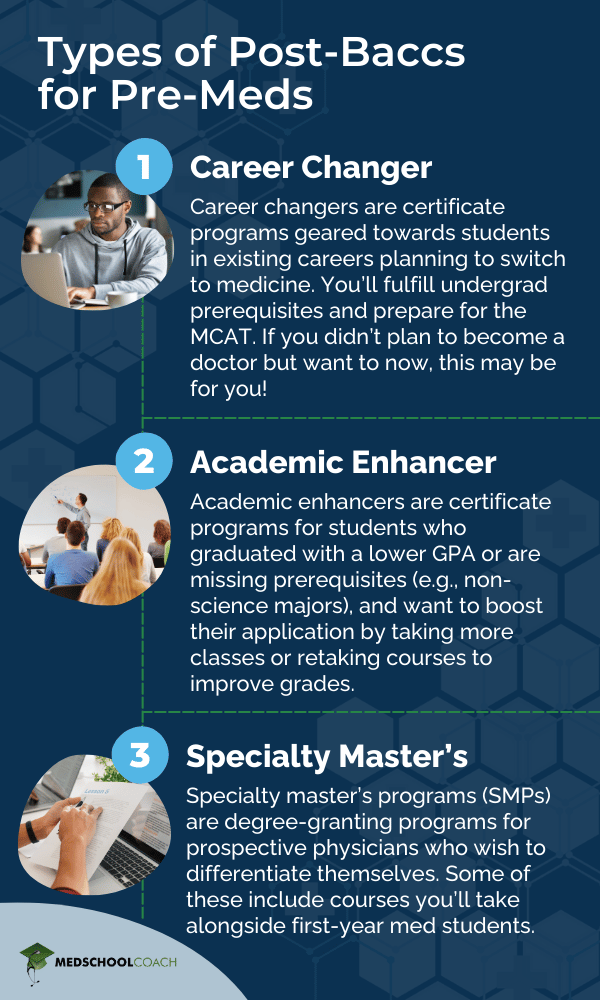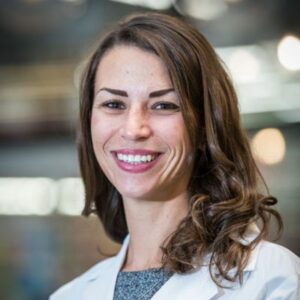
Table of Contents
Sometimes considered continuing education, a post-bacc is a non-degree-seeking program that enhances your academic record after undergrad or when switching careers. You can enroll in a post-baccalaureate program or special master’s program to strengthen your application if you have a low-grade point average or not enough prerequisites.
These programs are great for nontraditional students, pre-meds who didn’t take many science courses, or folks who just need a higher GPA.
A post-baccalaureate certificate is different from a bachelor’s degree. A post-bacc lets students improve their GPA, get prerequisite courses they need, and sometimes even get hands-on experience to strengthen their prospects for medical school.

Benefits of a Post-Baccalaureate
There are many benefits of pursuing a post-baccalaureate program, such as improving your academic record and getting flexible opportunities to fulfill prerequisites and boost your med school application.
You don’t have to enroll in a post-bacc at your undergrad or the med school where you want to go. It may benefit you, though, to attend a post-bacc that is associated with or linked to a med school you want to apply to.
You can technically complete post-bacc coursework DIY-style, choosing a la carte courses, but we recommend joining a pre-established post-bacc program. Let’s discuss the benefits of joining a post-baccalaureate certificate program below.
LISTEN: How a Post-Bacc Can Help You Achieve Your Dream
1. More MCAT Prep Opportunities
Many post-bacc programs include MCAT preparation courses. This is a great perk if you haven’t taken the MCAT yet or want to improve your score on a retake.
2. Extracurricular Opportunities
Post-bacc students should use this time to improve their volunteering, clinical, and research experience. Post-bacc programs are a great way to find and participate in more extracurriculars to strengthen your medical school application.
Many programs have job boards where employers and hospitals can promote clinical or research opportunities, both paid and volunteer. Real-life experience in a clinical or research setting can be very influential when writing a compelling personal statement when you’re ready to apply.
3. Flexible Scheduling
After completing your undergrad, you likely have to support yourself financially. Post-bacc programs are structured with this in mind.
You can find programs of different lengths and formats. These are some typical choices you get when choosing a post-bacc program:
- Full-time or part-time
- In-person or online
- One year or two years
- Day or night classes
Many of these programs are flexible regarding which supplemental courses you take. For example, if you took calculus as an undergrad, you won’t have to retake it. The goal here isn’t a structured program with a list of required courses; it’s actually to fill in your unique gaps and educational needs.
4. Condensed Coursework
You will probably appreciate the streamlined coursework post-bacc programs offer if you catch up on missed prerequisites. Classes won’t take as long to complete as they might in an undergrad setting.
Find out your odds of getting into medical school with our MSC Score tool – just enter metrics like GPA, MCAT, and extracurricular hours.
5. Networking Opportunities
Post-bacc programs have good relationships with medical schools, so they often bring in lecturers and health professionals you usually wouldn’t meet in undergrad or in the wild.
This exposure could lead you to career paths you hadn’t considered before or even potential mentors for letters of recommendation and lifelong guidance.
6. Medical School Linkage Programs
Many post-bacc programs are affiliated with specific medical schools through linkage programs. Attending a post-bacc program can give you an edge when you apply to certain med schools.
We’ll take a closer look at linkage programs later in this article.
7. A Stand-Out Medical School Application
Post-baccalaureate work can give your med school application a competitive edge. If your GPA from undergrad was lower than you would have liked, a post-bacc can greatly increase your chances of acceptance when applying to health professional schools.
Let’s do a simple thought exercise from an admissions committee point of view to see why a special master’s and post-bacc program may be so appealing:
- Applicant A: 3.60 undergraduate GPA, 506 MCAT score
- Applicant B: 3.40 undergraduate GPA, 506 MCAT score, 3.90 GPA in a special masters program with first-year medical school classes (such as microbiology, physiology, anatomy)
All other things being equal, an AdCom will select applicant B. Why? That applicant has proven they can handle medical school classwork while it’s unclear if applicant A can. A strong post-bacc GPA can make up for a weaker undergraduate GPA.
Read Next: The 32-Hour Rule: Myth or Fact? Plus, Med Schools that Use It
Types of Post-Bacc Programs
Before applying to medical school, different types of post-bacc programs have different benefits. Below are the three primary types of post-baccalaureate programs.
Career Changer Programs
Career Changer Programs are specifically designed for students who have decided later in life that medicine is what they want to do. For instance, this might work for a person who was in finance for years but now wants to jump into the world of medicine.
You will essentially take the usual pre-med course load, minus any classes you’ve already taken. Then you can apply to med schools without a science degree. This course load usually includes:
- General chemistry
- Biology
- Organic chemistry
- Physics
- Various labs
- Psychology
- Biochemistry
Career Changer Programs provide a basic structure that most benefits those switching careers. You can typically finish this program in 18-24 months.
Academic Enhancer Programs
Academic Enhancer Programs let you prove to medical schools that you have the intellectual stamina to get through the first 2 years of medical school.
In these programs, students typically enroll in graduate-level classwork.
This kind of post-bacc is for students who took most or all of their pre-med classes in college but had less-than-stellar GPAs, or for students who don’t already have the appropriate prerequisite science courses for a school of medicine.
You might consider an enhancer program if your GPA is 3.60 or below or you don’t have the necessary prerequisite competencies. Also, remember, a low science-math GPA can sully a higher overall GPA.
Academic Enhancer Programs also benefit students who weren’t accepted to medical school the first time. Check out our tips for reapplying to med school.
You’ll find a lot of educational enhancer programs that have varied and exciting coursework, including topics like:
- Biochemistry
- Neurobiology
- Physiology
- Anatomy
- Molecular Biology
- Biotechnology
Read Next: Should I Attend a Caribbean Medical School or Try to Stay in the US?
Specialty Master’s Program (SMP)
SMPs are genuine master’s programs, so they won’t impact your undergraduate GPA. This is graduate school coursework, often focusing on health sciences. Specific courses vary by program, but SMPs assume you’ve already taken the prerequisite courses to get into medical school. Doing well in SMPs can help offset any low grades you might have in med school prerequisite courses, but they won’t replace those grades.
So, why choose a specialty master’s program? Specialty Master’s Programs allow students to pursue an education that will inform their medical careers. A second set of official transcripts will also boost your academic record, provided you maintain good grades at the SMP.
Two of the most well-known of these include the Accelerated Interdisciplinary Biomedical Sciences Master’s Program at New York Medical Medical College or a similar program at New York Institute of Technology College of Osteopathic Medicine.
Work 1-on-1 with a Physician Advisor to create a medical school application that stands out.
Cost & Financial Aid
Post-bacc program tuition varies by school, but you can expect to pay $15,000-$40,000. Some high-quality institutions, such as Columbia or Georgetown, may cost up to $70,000.
Remember, because most post-bacc programs are not degree-seeking programs, Federal and State aid generally does not apply. You may find private student loan opportunities, but beware of predatory lenders and unfavorable loan terms.
There are scholarships specifically designed for both career changers and academic enhancers enrolling in a post-bacc program.
Specialty Master’s Programs should be eligible for federal aid, as they are degree-granting programs.
Master’s Degree vs. Post-Baccalaureate
What’s the difference between a master’s degree program and a post-baccalaureate program?
- A Master’s is a graduate degree program. These programs are best for students who have taken the medical school prerequisite courses and want to prove themselves with graduate-level coursework. You’ll graduate from the Master’s program with a graduate degree. Some special master’s programs are designed as post-bacc programs for students heading to medical school. In this case, the GPA from your Master’s degree will be the primary focus for medical school admissions.
- Most post-baccalaureate programs are certificate programs. Excluding special Master’s programs, post-bacc programs are designed for students who haven’t taken the med school prerequisite courses or who need to remediate these courses before applying to medical school. You won’t receive a graduate degree, but you should be better prepared to get into medical school.
Learn More: Benefits of MD-PhD Programs
Post-bacc programs are sometimes referred to as special master’s programs, educational enhancer programs, or career changer programs.
| Master’s (Including Special Master’s Program Post-Bacc Programs) | Non-Master’s Postbacc |
| Degree | No degree |
| Graduate level courses | Undergraduate level courses |
| Confers a new graduate GPA | Enhances undergrad GPA |
| Thesis portion | No thesis portion |
| Federal and State financial aid available | No Federal or State financial aid |
| Part of an established education program | Credit hours can be earned for science courses without program guidance |
What Are Linkage Agreements?
Linkage is a formal agreement between a post-baccalaureate premedical program and a medical school (or several medical schools, of which you can typically choose one) that enables highly qualified students with a strong interest in one of these schools to accelerate the application process.
In other words, you can apply with an advantage to certain schools while still in the post-bacc program.
A linkage may even guarantee an interview at a particular school. But remember, an interview isn’t equivalent to an acceptance. That said, many medical schools take a substantial number of their students who perform well in their post-bacc programs.
Linkage also eliminates the need for an additional gap year. You can start medical school in the fall of the year you graduate from your post-bacc program. This means that you can start sooner, instead of waiting another year before med schools can evaluate those grades.
We recommend you research both the post-baccs you’re interested in and the med schools you want to apply to. See if there are linkages you can take advantage of.
How to Find a Post-Bacc That’s Right for You
Pick programs based on the curriculum you need or enjoy, tuition, extracurricular opportunities, and location. Online programs offer the most flexibility and tend to be the most cost-effective.
According to the Association of American Medical Colleges (AAMC), there are well over 300 post-bacc programs. You can browse their full list here.
Ask yourself or post-bacc advisors these questions before deciding:
- What percentage of students are accepted to MD schools after this program?
- What about the acceptance rate to DO schools?
- How long does the average person take to finish this post-bacc?
- Is there career advising available?
- Is there built-in MCAT studying time, including MCAT preparation classes?
- What electives can I take?
- Are there research opportunities?
- Are there clinical opportunities?
- Is there financial aid?
FAQs
Stand Out Among the Crowd — Work with MedSchoolCoach
If you’re considering applying to medical school, enrolling in a post-baccalaureate program is a great way to make your application stand out and further your career goals.
The cost can certainly be steep, and the time it takes can be intensive, but the benefits are great, too. By taking advantage of everything a post-baccalaureate program has to offer, you’re setting yourself up for success in both your application process and your future career as a physician.
Join the 92% of MedSchoolCoach clients who get accepted into medical school – get 1-on-1 admissions consulting to secure your future as a med student!
Though common along the premed journey, post-bacc programs have two significant downsides: time and money.
Yes, post-bacc can increase your odds of acceptance, but they are not strictly needed to get into med school. Ask yourself if you really need to spend the time and money on a post-bacc, or if it’s not worth it for your unique journey.
You should apply to four or five post-bacc programs.
On your medical school applications, it’s normal to apply to 25+ schools. But for post-bacc programs, you do not have to apply to nearly as many — just 4-5 should be more than enough.
Every post-bacc program has different eligibility requirements. Common admissions requirements include:
- GPA around 2.5 or higher
- Bachelor’s or equivalent degree
- Taking certain tests like the SAT or ACT
However, there are post-baccs that require more, and some require less.

Renee Marinelli, MD
Dr. Marinelli has practiced family medicine, served on the University of California Admissions Committee, and has helped hundreds of students get into medical school. She spearheads a team of physician advisors who guide MedSchoolCoach students.





